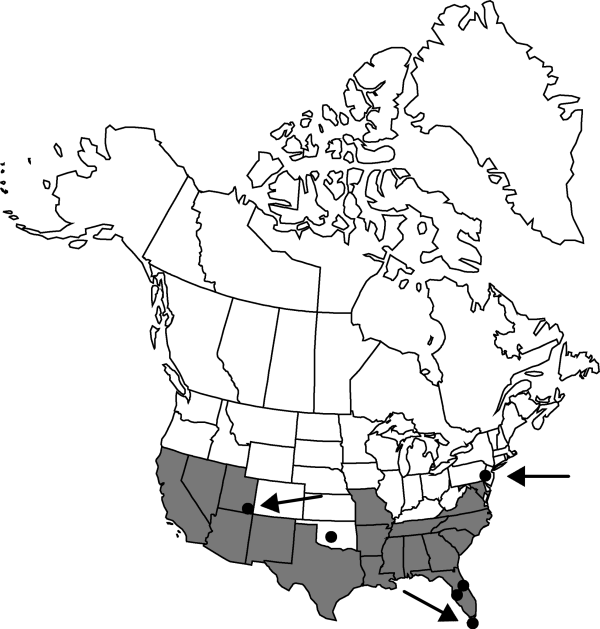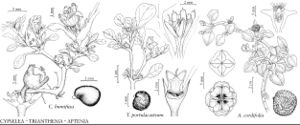Trianthema portulacastrum
Sp. Pl. 1: 223. 1753.
Plants annual, succulent, usually glabrous. Stems prostrate or decumbent, diffusely branched, to 10 dm; young branches with lines of minute hairs proximal to petioles. Leaves: unequal pairs alternating along stem; stipules dilated at base; petiole usually equaling blade; blade elliptic to orbiculate, to 4 cm, apex obtuse, often notched, or apiculate. Inflorescences: flowers usually solitary, sessile, in axils of smaller leaves (bracts) of some pairs, partly covered by sheathing stipule of bracts; bracteoles connate, 1–1.5 mm, apex acute. Flowers: calyx 3–5 mm; calyx lobes purple adaxially, lanceolate, 2.5 mm; stamens 5–10. Capsules cylindric, ± curved, 4–5 mm, corky, basal portion appearing embedded in stem, apical portion containing 1 seed; apical wings 2, prominent, erect, crestlike. Seeds ca. 7, dull reddish-brown to black, ridged, 1.5–2 mm.
Phenology: Flowering spring–fall.
Habitat: Moist or seasonally dry, usually open, wetlands including alkaline flats, playa lakes, banks of rivers, creeks, roadside depressions, beaches, disturbed areas including gardens, irrigated soils and ditches, fields, ballast, stockyards, sidewalks, railroad tracks
Elevation: 0-1000 m
Distribution

Ala., Ariz., Ark., Calif., Fla., Ga., La., Md., Miss., Mo., Nev., N.J., N.Mex., N.C., Okla., S.C., Tenn., Tex., Utah, Va., Mexico, West Indies, Central America, South America, Africa
Discussion
In Arizona, Trianthema portulacastrum is a host plant of the beet leafhopper (T. H. Kearney and R. H. Peebles 1960). Seed dispersal is achieved by several methods: one seed is dispersed in the detached cap of the capsule, which can float, and the other seeds are either dispersed individually from the capsule or remain on the annual, parent plant where they will germinate and establish new plants where the parent once grew or was deposited.
Selected References
None.
Lower Taxa
"dm" is not declared as a valid unit of measurement for this property.
